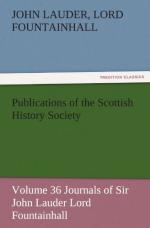But while Lauder was a supporter of the existing order of government and opposed to all revolutionary plans, his journals disclose that in the state of public affairs he found much matter for criticism and ground for anxiety. In 1674 he tells of what will happen ’whenever we get a fair and unpraelimited Parliament, which may be long ere we see it.’ In 1683 he writes sadly: ’Though we change the Governors, yet we find no change in the arbitrary government. For we are brought to that pass we must depend and court the Chancelor, Treasurer, and a few other great men and their servants, else we shall have difficulty to get either justice or despatch in our actions, or to save ourselves from scaith, or being quarrelled on patched up, remote and innocent grounds. This arbitrary way Lauderdale attempted, but did not attain so great a length in it as our statesmen do now; and they value themselves much in putting the military and ecclesiastic Laws to strict and vigorous execution, so that, let soldiers commit as great malversations and oppressions as they please, right is not to be got against them. Witness John Cheisly of Dalry’s usage with Daver and Clerk, in the Kings troupe, and Sir John Dalrymple’s with Claverhouse.’ In the same year he says of James, then Duke of York, and Monmouth, ’We know not which of their factions struggling in the womb of the State shall prevail.’ He regarded these political evils and dangers as beyond his power to remedy. It was not till after he had entered Parliament in 1685 that he made any public utterance on politics. In the last two years of James’s reign the Test Act was enforced against Nonconformist Protestants but not against Roman Catholics. Lauder, being then in Parliament, considered it his duty to take a part, and he made one or two very moderate speeches, which, although expressed with studious respect to the sovereign, were doubtless highly displeasing to the government.
OPINIONS ON ADMINISTRATION OF JUSTICE AND HIS CONTEMPORARIES.
INFLUENCE OF STUDIES ABROAD
[Sidenote: H.N. 40.]
In the matter of the administration of justice he writes with much less reserve in his journals. The system was bad. The jurisdiction of the Privy Council, who tried a considerable number of causes, was ill-defined. The judges since the time of Charles I. were removable magistrates, entirely in the dependence of the Crown. Even the ordinary Lords of Session were not always trained lawyers—Lauder’s father-in-law, for example, Sir Andrew Ramsay, long Provost of Edinburgh, became a judge with the title of Lord Abbotshall. There were besides four extraordinary lords who were never lawyers, and were not bound to attend and hear causes pleaded, but they had the right to vote. At the Revolution one of the reasons assigned for declaring the Crown vacant was ‘the changing of the nature of the judges’ gifts ad vitam aut culpam, and giving them commissions




